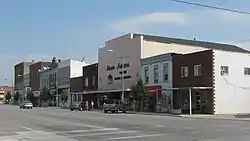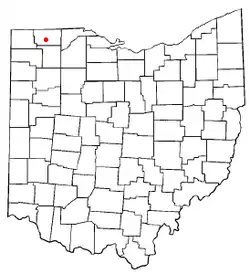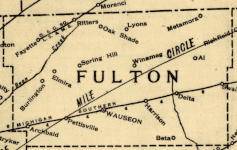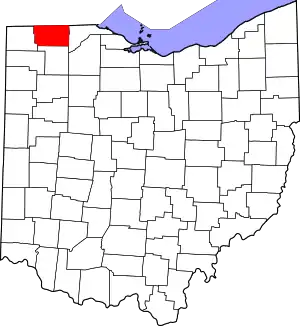Wauseon, Ohio
Wauseon (/ˈwɔːsiɒn/ WAW-see-on)[5] is a city in and the county seat of Fulton County, Ohio,[6] approximately 31 mi (51 km) west of Toledo. The population was 7,568 at the time of the 2020 census.
Wauseon, Ohio | |
|---|---|
 Buildings in downtown Wauseon | |
| Motto: A City You'll Take To Heart | |
 Location of Wauseon, Ohio | |
 Location of Wauseon in Fulton County | |
| Coordinates: 41°33′8″N 84°8′21″W | |
| Country | |
| State | |
| County | Fulton |
| Township | Clinton |
| Government | |
| • Mayor | Kathy Huner[1] |
| Area | |
| • Total | 5.35 sq mi (13.85 km2) |
| • Land | 5.32 sq mi (13.78 km2) |
| • Water | 0.03 sq mi (0.07 km2) |
| Elevation | 771 ft (235 m) |
| Population (2020) | |
| • Total | 7,568 |
| • Density | 1,422.56/sq mi (549.28/km2) |
| Time zone | UTC-5 (Eastern (EST)) |
| • Summer (DST) | UTC-4 (EDT) |
| ZIP code | 43567 |
| Area code(s) | 419 and 567 |
| FIPS code | 39-81928[4] |
| GNIS feature ID | 1047628[3] |
| Website | www |
History
Wauseon was platted 1853 when the Michigan Southern Air Railway was extended to that point.[7] Land speculators bought 160 acres of land, which would become the City of Wauseon.[8] The original name for the city was "Litchfield" after Litchfield, New York, where many of the city's new settlers had emigrated from.[9] However, Hortensia Hayes, the daughter of an early settler, suggested that the new village be named after an Ottawa Tribe Chief named Wauseon, who was forced by the federal government to forfeit their land, before moving to Oklahoma in 1839.[10] The village was incorporated in 1859. With the commercial success that the railroad brought, Wauseon would grow larger than the original seat of Fulton County (Ottokee), and in 1869 Wauseon was named the county seat.[11] The Fulton County Courthouse was built in 1871.
Between 1901 and 1939, the community was served by the Toledo and Indiana Railway, an interurban between Toledo and Bryan, Ohio. The construction of the Ohio Turnpike in the mid 20th century also helped lead to the commercial growth of Wauseon.[7]
Geography
Wauseon is located at 41°33′8″N 84°8′21″W (41.552230, -84.139126).[14]
According to the United States Census Bureau, the city has a total area of 5.19 square miles (13.44 km2), of which 5.17 square miles (13.39 km2) is land and 0.02 square miles (0.05 km2) is water.[15]
Demographics
| Census | Pop. | Note | %± |
|---|---|---|---|
| 1860 | 378 | — | |
| 1870 | 1,474 | 289.9% | |
| 1880 | 1,905 | 29.2% | |
| 1890 | 2,060 | 8.1% | |
| 1900 | 2,148 | 4.3% | |
| 1910 | 2,650 | 23.4% | |
| 1920 | 3,035 | 14.5% | |
| 1930 | 2,889 | −4.8% | |
| 1940 | 3,016 | 4.4% | |
| 1950 | 3,494 | 15.8% | |
| 1960 | 4,311 | 23.4% | |
| 1970 | 4,932 | 14.4% | |
| 1980 | 6,170 | 25.1% | |
| 1990 | 6,322 | 2.5% | |
| 2000 | 7,091 | 12.2% | |
| 2010 | 7,332 | 3.4% | |
| 2020 | 7,568 | 3.2% | |
| 2021 (est.) | 7,525 | −0.6% | |
| Sources:[16][17][18][19][20][4][21] | |||
2010 census
As of the census[22] of 2010, there were 7,332 people, 2,798 households, and 1,939 families residing in the city. The population density was 1,418.2 inhabitants per square mile (547.6/km2). There were 3,061 housing units at an average density of 592.1 per square mile (228.6/km2). The racial makeup of the city was 90.3% White, 0.9% African American, 0.3% Native American, 1.0% Asian, 5.2% from other races, and 2.3% from two or more races. Hispanic or Latino of any race were 14.2% of the population.
There were 2,798 households, of which 38.0% had children under the age of 18 living with them, 51.4% were married couples living together, 13.1% had a female householder with no husband present, 4.8% had a male householder with no wife present, and 30.7% were non-families. 26.6% of all households were made up of individuals, and 10.7% had someone living alone who was 65 years of age or older. The average household size was 2.58 and the average family size was 3.10.
The median age in the city was 35.4 years. 28.6% of residents were under the age of 18; 8.2% were between the ages of 18 and 24; 25.6% were from 25 to 44; 24.5% were from 45 to 64; and 13.1% were 65 years of age or older. The gender makeup of the city was 47.9% male and 52.1% female.
2000 census
As of the census[4] of 2000, there were 7,091 people, 2,706 households, and 1,875 families residing in the city. The population density was 1,437.6 inhabitants per square mile (555.1/km2). There were 2,851 housing units at an average density of 578.0 per square mile (223.2/km2). The racial makeup of the city was 92.77% White, 0.55% African American, 0.37% Native American, 0.82% Asian, 0.01% Pacific Islander, 4.02% from other races, and 1.47% from two or more races. Hispanic or Latino of any race were 9.79% of the population.
There were 2,706 households, out of which 37.9% had children under the age of 18 living with them, 63.0% were married couples living together, 12.2% had a female householder with no husband present, and 30.7% were non-families. 26.0% of all households were made up of individuals, and 10.6% had someone living alone who was 65 years of age or older. The average household size was 2.58 and the average family size was 3.13.
In the city the population was spread out, with 29.1% under the age of 18, 9.1% from 18 to 24, 28.8% from 25 to 44, 20.5% from 45 to 64, and 12.5% who were 65 years of age or older. The median age was 34 years. For every 100 females, there were 88.7 males. For every 100 females age 18 and over, there were 85.1 males.
The median income for a household in the city was $39,591, and the median income for a family was $48,981. Males had a median income of $32,645 versus $24,042 for females. The per capita income for the city was $17,491. About 3.9% of families and 5.2% of the population were below the poverty line, including 6.5% of those under age 18 and 1.7% of those age 65 or over.
Parks and attractions

- Biddle Park, opened in 2009, is a 52-acre sports complex and park that consists of 8 baseball/softball fields, 3 T-ball fields, batting cages, 3 basketball courts, 3 sand volleyball courts, a football field, and 9 soccer pitchers. The park will add 4 more baseball/softball fields before being completed.[23] Biddle Park hosts many events each summer, city league youth sports, multi state baseball and softball tournaments, NWOAL league tournaments, and the city's Fourth of July Fireworks display. The park is named after Dorothy Biddle, who donated 1.7 million dollars to the building of the park in 2003.[24]
- City of Wauseon Pool, opened in 2018, consists of two diving boards, two large slides, along with a zero depth entry which include tumble buckets and a few drop for the littles.
- Fulton County Fair, including the Fulton County 9/11 Memorial
- Midwest Geobash, annual geocaching event is held in July at the Fulton County Fairgrounds.[25]
- Wabash Cannonball Trail, features 4 miles of paved trail in the city of Wauseon
- AMCA National Motorcycle Meet, one of the largest antique motorcycle swap meets and judging events in the United States.[26]
- Sterlena the Cow, a 14 foot tall fiberglass cow that once served as the mascot for Sterling's Dairy before the company went out of business. Sterlena now resides at the Fulton County Fairgrounds.[27]
Education

Wauseon Exempted Village School District operates four schools within the city: a primary school, elementary school, middle school, and Wauseon High School.[28]
Wauseon Public Library was originally funded by tycoon and entrepreneur Andrew Carnegie in 1906.[29] In 2005, the library loaned more than 238,000 items to its 20,000 cardholders. Total holdings in 2005 were over 91,000 volumes with over 210 periodical subscriptions. From 2016 to 2017 the library underwent a major renovation, fixing the crumbling foundation of the library building. The library temporarily moved out to the former location of Bill's Lockeroom on Shoop Avenue until mid April 2017 before moving back in to the original library building on Elm Street.[30][31]
Media
The community is served by the Fulton County Expositor, an AIM Media Midwest newspaper. INTV-Channel 5 is the local television station[32]
Medical care
Fulton County Health Center is a rural critical access hospital that includes an emergency department with a heliport for medical evacuation.
Notable people
- James A. Boucher, former US Representative of Albany County, Wyoming
- James Massey, academic and information theorist
- Richard Mourdock, former Republican state treasurer of Indiana
- Barney Oldfield, racecar driver
- Jean Paul Slusser, painter, designer, art critic, professor, and director of the University of Michigan Museum of Art
- Stephen Stahl, psychiatrist, psychopharmacologist
- Rick Volk, member of the Baltimore Colts' Super Bowl III and V championship teams
- Marjorie M. Whiteman, International law expert and member of the Ohio Women's Hall of Fame
References
- "MAYOR'S OFFICE". City of Wauseon, OH. Retrieved December 22, 2015.
- "ArcGIS REST Services Directory". United States Census Bureau. Retrieved September 20, 2022.
- "US Board on Geographic Names". United States Geological Survey. October 25, 2007. Retrieved January 31, 2008.
- "U.S. Census website". United States Census Bureau. Retrieved January 31, 2008.
- "E.W. Scripps School of Journalism Ohio Pronunciation Guide". www.ohio.edu. Ohio University. 2016. Retrieved August 29, 2021.
- "Find a County". National Association of Counties. Retrieved June 7, 2011.
- "History - City of Wauseon". www.cityofwauseon.com. Retrieved January 7, 2019.
- Reighard, Frank H. (1920). A Standard History of Fulton County, Ohio (Volume 1). Lewis Publishing Company. p. 209.
- "race | Wauseon Remembers". Wauseon Downtown Association. Retrieved January 7, 2019.
- "race | Wauseon Remembers". Wauseon Downtown Association. Retrieved January 7, 2019.
- Aldrich, Lewis Cass (1888). History of Henry and Fulton counties, Ohio : with illustrations and biographical sketches of some of its prominent men and pioneers. Syracuse, N. Y.: D. Mason & Co., Publishers. pp. 288–289.
- Railroad & township map of Ohio (Map). Library of Congress. 1851. Retrieved April 11, 2016.
- J. A. Norton, Ohio commissioner of railroads & telegraphs (1890). Railroad map of Ohio (Map). Retrieved April 11, 2016.
- "US Gazetteer files: 2010, 2000, and 1990". United States Census Bureau. February 12, 2011. Retrieved April 23, 2011.
- "US Gazetteer files 2010". United States Census Bureau. Archived from the original on January 25, 2012. Retrieved January 6, 2013.
- "Population of Civil Divisions Less than Counties" (PDF). Statistics of the Population of the United States at the Tenth Census. U.S. Census Bureau. 1880. Retrieved November 28, 2013.
- "Population: Ohio" (PDF). 1910 U.S. Census. U.S. Census Bureau. Retrieved November 28, 2013.
- "Population: Ohio" (PDF). 1930 US Census. U.S. Census Bureau. Retrieved November 28, 2013.
- "Number of Inhabitants: Ohio" (PDF). 18th Census of the United States. U.S. Census Bureau. 1960. Retrieved May 17, 2020.
- "Ohio: Population and Housing Unit Counts" (PDF). U.S. Census Bureau. Retrieved May 17, 2020.
- "Wauseon city, Ohio". census.gov. Retrieved July 7, 2022.
- "U.S. Census website". United States Census Bureau. Retrieved January 6, 2013.
- Design, Chief Web. "Shelter House Rental & Park Information - City of Wauseon". www.cityofwauseon.com. Retrieved January 29, 2018.
- "52-acre park is dedicated in Wauseon". The Blade. June 2, 2009. Retrieved January 29, 2018.
- Scheuer, Sonja. "Bash History". www.midwestgeobash.org. Archived from the original on April 21, 2018. Retrieved April 20, 2018.
- "Home | Wauseon National Meet Welcomes You". wauseonnationalmeet.org. Retrieved May 26, 2021.
- "Sterlina The Cow - Roadside Wonders". roadsidewonders.net. July 18, 2010. Retrieved January 29, 2018.
- "Homepage". Wauseon Exempted Village Schools. Retrieved February 25, 2018.
- "Wauseon Public Library". wauseonlibrary.org. Retrieved May 26, 2021.
- "Wauseon Public Library History".
- "2005 Ohio Public Library Statistics:Statistics by County and Town". State Library of Ohio. Archived from the original on September 24, 2006. Retrieved November 10, 2006.
- http://intv5.com/schedule.htm


